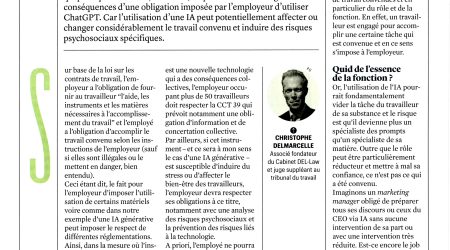Covid-19 : Réquisition
Posted the 3 March 2020McDonald's, Quick, and Burger King announced on Wednesday, March 18, the start of the lockdown, that they would cease their "drive-in" restaurant activities, i.e., takeout services. Was this necessary? Was it civic-minded?
In the face of Covid-19, does worker protection necessarily go hand in hand with civic duty?
In reality, these large chains are closely following a number of caterers or restaurants providing catering services, many of which quickly announced, sometimes even before the lockdown, that they would cease these activities. However, the strict lockdown in effect since Wednesday noon does not prohibit catering or "drive-in" activities. Only restaurant activities had already been banned under the reinforced phase two. The argument put forward is worker protection – with the understanding that, in principle, these businesses should be able to ensure sufficient distancing in their premises (more than 1.5 meters), even if it impacts productivity, and therefore should not be subject to closure on this basis. It is true that social legislation – the law of August 4, 1996, and the workplace well-being code – imposes very heavy obligations on employers in terms of risk prevention. And regardless of this, it is obviously commendable that companies are concerned about the well-being of their workers.
Why should Carrefour, Delhaize, Cora, and all the other players in the sector, including small independents or other restaurateurs who still deliver (Pizza Hut, etc.), be the only ones responsible for feeding a confined population?
Relatively simple measures.
That being said, and one might argue that I am not in their shoes, comfortably seated as I am, there are still relatively simple and financially affordable measures (at least for the larger players in the sector, we understand that small independent caterers are in a different situation) that could have ensured optimal safety for workers, especially those serving "drive-in" customers. These customers, let's remember, are in their cars, outside, at least one meter apart, and thus have no direct physical contact. Gloves and masks, cleaning products, and even additional plexiglass protections could have been considered. Unfortunately, workers in supermarkets, bakeries, butcher shops, and the entire food sector — as well as other essential services — are exposed to just as many, if not more, risks. Why should Carrefour, Delhaize, Cora, and all the other players in the sector, including small independents or other restaurateurs still delivering (such as Pizza Hut, etc.), be the ones to bear the responsibility of feeding an entire confined population? Based on the same arguments used by Quick, McDonald's, or Burger King, they could also decide to stop their operations. What would we do then?
The question of worker requisition is raised.
Should we, in this case, see the government requisition workers—a legally complex issue, to say the least? Risk prevention is important, as is civility. Striking a balance is undoubtedly challenging. This is, however, an opportunity to thank all those workers who remain at their posts despite the stress and fear. May their sense of duty and civility inspire us in these difficult times.
Related articles

Is an employer allowed to mandate the use of artificial intelligence tools by employees ? (Trends, 17-07-2025)

Caution if a former colleague opposed to your employer asks you to testify in their favor
